This concludes Liz’s five-part series on Mormon speculative fiction.
Well, I’m back for the final part of this series on Mormons in speculative fiction. This last portion of my tour through Mormons in SFF is the gift shop, my “if you’d like to know more” pitch. I am writing this as a guide to those who are fans of science fiction and fantasy, perhaps Mormons themselves, and want to become part of the conversation between our religion and literature. Consider this your cheat sheet to the best resources I know of out there. (Or perhaps the reading list for a class on Mormons in SFF?) This will be much more of a list format than the previous articles, so bear with me.
Mormons have really taken off in this area of fiction. There are so many interesting stories and angles in this area that have been explored, that are being explored, and that have yet to be explored. I hope that by making these resources centralized and accessible, that more critics (amateur and otherwise) will be empowered to become part of the conversation without ignorantly retreading past ground.
Other Overviews of the Genre
A lot of the information in the earlier parts of this series came from other authors who had written overviews of Mormons in science fiction and fantasy over the years. I am in their debt and couldn’t include all the details they listed. A careful critic would do well to read the following articles through. The earliest article I could find was by Sandy and Joe Straubahaar’s article “Science Fiction and Mormonism: A Three-Way View.” Originally given at an AML conference in 1981, you can find it online in Sunstone July/August 1981.
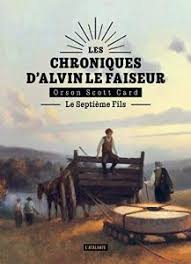 The next major overview was from Michael R. Collings. A professor of creative writing and literature at Pepperdine until his retirement in 2010, he has published several books about Orson Scott Card’s works. You can also find his overview of Mormons in speculative fiction up to 1986, “Refracted Visions and Future Worlds,” through Dialogue’s archives. You can find a further catalog on his works of and about science fiction through the Internet Speculative Fiction Database.
The next major overview was from Michael R. Collings. A professor of creative writing and literature at Pepperdine until his retirement in 2010, he has published several books about Orson Scott Card’s works. You can also find his overview of Mormons in speculative fiction up to 1986, “Refracted Visions and Future Worlds,” through Dialogue’s archives. You can find a further catalog on his works of and about science fiction through the Internet Speculative Fiction Database.
In 1998, Scott and Marny Parkin published another overview of the genre, entitled “A New Mormon Battalion: The Rise of Speculative Fiction among Mormon Writers.” You can find it in Association for Mormon Letters Annual of 1998. Marny Parkin also maintained The Bibliography of Mormon Speculative Fiction, a great place to track down works by Mormons in the SF field. Sadly, it has not been updated since 2014, but still, there’s a lot of good data in there. Besides the exhaustive list of works up until 2014, the links page contains a list of great places to look for more research on the topic, including links to author pages, SFF conventions that attract an LDS audience, and LDS or Utah affiliated writers associations. Though many of the links are (understandably) out of date, this list should at least give you an idea of where to look.
Finally, in 2010, the online magazine Mormon Artist published a commentary on Mormons in SF by Katherine Morris & Kathleen Dalton-Woodbury called “‘Is It Something in the Water?’ Why Mormons Write Science Fiction and Fantasy“. Though it’s not really a historical overview, it provides some updates on the topic since 1998.
From the Authors
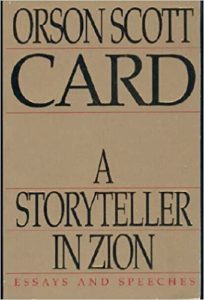 Speaking of hearing from the authors, let’s talk about where you can find what prominent Mormon authors have said about the relationship between their work and their beliefs. Obviously, we have to start from the foundational man himself, Orson Scott Card. I think his 1993 book A Storyteller in Zion is a crucial collection of essays for anyone interested in this genre. Of particular note is his essay “Science Fiction and Mormonism.” The full essay is only found in the book, but it was developed out of his letter to the editor in Dialogue, responding to Michael R Colling’s article, mentioned above. This short form of the essay can be read in Dialogue, Vol 18, Issue 2, starting on page 11. Card’s website can be pretty opaque on where to find his commentary on his work, but you can find a few things if you look hard enough. You can also find some of his published works of criticism by looking up his entry in the Mormon Literature and Creative Arts database and searching on the page for “criticism” or “essay.”
Speaking of hearing from the authors, let’s talk about where you can find what prominent Mormon authors have said about the relationship between their work and their beliefs. Obviously, we have to start from the foundational man himself, Orson Scott Card. I think his 1993 book A Storyteller in Zion is a crucial collection of essays for anyone interested in this genre. Of particular note is his essay “Science Fiction and Mormonism.” The full essay is only found in the book, but it was developed out of his letter to the editor in Dialogue, responding to Michael R Colling’s article, mentioned above. This short form of the essay can be read in Dialogue, Vol 18, Issue 2, starting on page 11. Card’s website can be pretty opaque on where to find his commentary on his work, but you can find a few things if you look hard enough. You can also find some of his published works of criticism by looking up his entry in the Mormon Literature and Creative Arts database and searching on the page for “criticism” or “essay.”
Unfortunately, I cannot find much from Stephenie Meyer herself talking about the influence of religion on her work. There are plenty of articles in mainstream media speculating about the connection. There is one interview on A Motley Vision which directly addresses Mormonism, but nothing on her blog. I would love to be pointed to some more resources from the author herself, if there are any to be had.
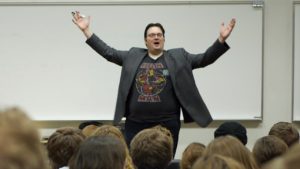 Brandon Sanderson has a few statements on how his faith interacts with his writing. The FAQ section of his site contains a section on “Religion” (with answers to questions like “Does your religion shape your writing?”and “How did your LDS Mission Influence your writing?” You can find even more commentary from him on specific books or questions by using Arcanum, a database where fans collect the “Words of Brandon” (no, we’re not a cult, promise). There are pages and pages of answers to religious oriented questions just waiting for analysis. You can also find recordings of several years of his lectures for the BYU Writing Science Fiction and Fantasy course on YouTube. There is some commentary there directed at a BYU student audience, especially in the early years.
Brandon Sanderson has a few statements on how his faith interacts with his writing. The FAQ section of his site contains a section on “Religion” (with answers to questions like “Does your religion shape your writing?”and “How did your LDS Mission Influence your writing?” You can find even more commentary from him on specific books or questions by using Arcanum, a database where fans collect the “Words of Brandon” (no, we’re not a cult, promise). There are pages and pages of answers to religious oriented questions just waiting for analysis. You can also find recordings of several years of his lectures for the BYU Writing Science Fiction and Fantasy course on YouTube. There is some commentary there directed at a BYU student audience, especially in the early years.
A great resource for hearing from a large spectrum of LDS speculative fiction writers is Mormon Artist’s interview series. They have interviews with Larry Correia, Shannon Hale, Mette Ivie Harrison, Tracy Hickman, Brandon Mull, Steven L. Peck, Louisa Perkins, Eric James Stone, and Dan Wells. It’s a great place to look if you are interested in writing about the works of lesser known authors. Also consider looking up authors on the Mormon Literature and Creative Arts database (https://mormonarts.lib.byu.edu), as each author’s page has a short biography of LDS-related facts, including where many of them served missions.
Journals
The big three Mormon journals–BYU Studies, Dialogue, and Sunstone–each have some articles about various science fiction and fantasy topics. The archives for each of these magazines is available online. BYU Studies has reviews for some speculative fiction works by prominent authors. Try searching for your book or author in their archives. Nothing on Brandon Sanderson yet, but searching for Orson Scott Card and Twilight both yield some results.
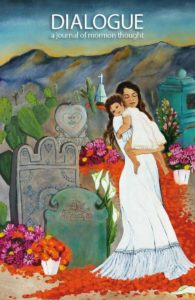 Dialogue’s archives are the most accessible online. A search in the archive for science fiction yields the overview by Michael R. Collings mentioned earlier and a review of A Planet Called Treason (an early Card work). You can find a few more essays on Card’s work by searching for his name directly. There is one article on Stephenie Meyer’s work (“Reading the Mormon Gothic“), and nothing on Brandon Sanderson yet.
Dialogue’s archives are the most accessible online. A search in the archive for science fiction yields the overview by Michael R. Collings mentioned earlier and a review of A Planet Called Treason (an early Card work). You can find a few more essays on Card’s work by searching for his name directly. There is one article on Stephenie Meyer’s work (“Reading the Mormon Gothic“), and nothing on Brandon Sanderson yet.
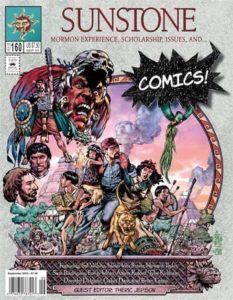 Sunstone has a lot of articles in their archive, along with audio recordings of panels of interest. Most of this content is on Orson Scott Card, including this interesting panel on Pastwatch, one of his lesser discussed works. I also found several Twilight related articles, but nothing on Brandon Sanderson or Dan Wells. The archive is plagued with broken links, but if you can find the article citation, you can go back and find the issue easily enough.
Sunstone has a lot of articles in their archive, along with audio recordings of panels of interest. Most of this content is on Orson Scott Card, including this interesting panel on Pastwatch, one of his lesser discussed works. I also found several Twilight related articles, but nothing on Brandon Sanderson or Dan Wells. The archive is plagued with broken links, but if you can find the article citation, you can go back and find the issue easily enough.
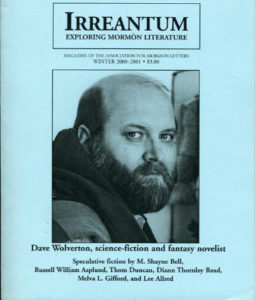 More difficult to come by are journals of Mormon literature in particular. Obviously, you should search the Association for Mormon Letters blog as well as the AML Annuals and Irreantum archives. Unfortunately, the Irreantum archives are PDFs and not searchable, but I did locate a review of Dan Wells’ Serial Killer series. Mormon Artist, as mentioned before, has extensive author interviews and a few articles on the subject of Mormons in speculative fiction. Some early years of the proceedings of LTUE are published, some are not. If you can get a hold of the Leading Edge, there are some critical essays in there as well. Both of these are available in the BYU Harold B. Lee Library, but will be difficult to find outside of Utah, or even off of BYU campus.
More difficult to come by are journals of Mormon literature in particular. Obviously, you should search the Association for Mormon Letters blog as well as the AML Annuals and Irreantum archives. Unfortunately, the Irreantum archives are PDFs and not searchable, but I did locate a review of Dan Wells’ Serial Killer series. Mormon Artist, as mentioned before, has extensive author interviews and a few articles on the subject of Mormons in speculative fiction. Some early years of the proceedings of LTUE are published, some are not. If you can get a hold of the Leading Edge, there are some critical essays in there as well. Both of these are available in the BYU Harold B. Lee Library, but will be difficult to find outside of Utah, or even off of BYU campus.
If you are interested in writing about Mormons and SFF, please consider submitting something to the upcoming Science Fiction Research Association special issue on Mormonism and SF. Abstracts are due March 1, 2021. I’d love to talk ideas with you and help to point you towards good resources.
And that’s what I have, folks! I am hoping to start writing more about Brandon Sanderson’s works myself soon, if this pesky pandemic would just stop stealing all my energy and time. If you are interested in writing about Mormons and SFF, I’d love to hear from you and help to point you towards good resources. You can contact me by emailing contact@lizbusby.com or on twitter where I’m @lizbusby.
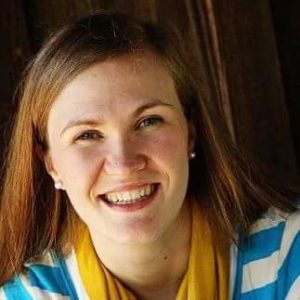 Liz Busby is a writer of creative non-fiction and speculative fiction. She loves reading science fiction, fantasy, history, science writing, and self help, as well as pretty much anything that holds still for long enough. Liz graduated from BYU with a BA in English, and lives in Bellevue, WA, with her husband and four kids. Follow her writing at www.lizbusby.com.
Liz Busby is a writer of creative non-fiction and speculative fiction. She loves reading science fiction, fantasy, history, science writing, and self help, as well as pretty much anything that holds still for long enough. Liz graduated from BYU with a BA in English, and lives in Bellevue, WA, with her husband and four kids. Follow her writing at www.lizbusby.com.

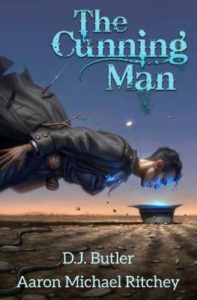
Liz, thanks for an engaging and thoughtful series on Mormon SF. I enjoyed reading it and seeing the field from your perspective. Only wish there’d been many more segments. 🙂
This might be good place to mention that SFRA (the Science Fiction Research) is publishing a special “Mormonism and SF” issue of their SFRA Review and has issued a call for papers. https://sfrareview.org/2020/08/11/51-3-cfp/